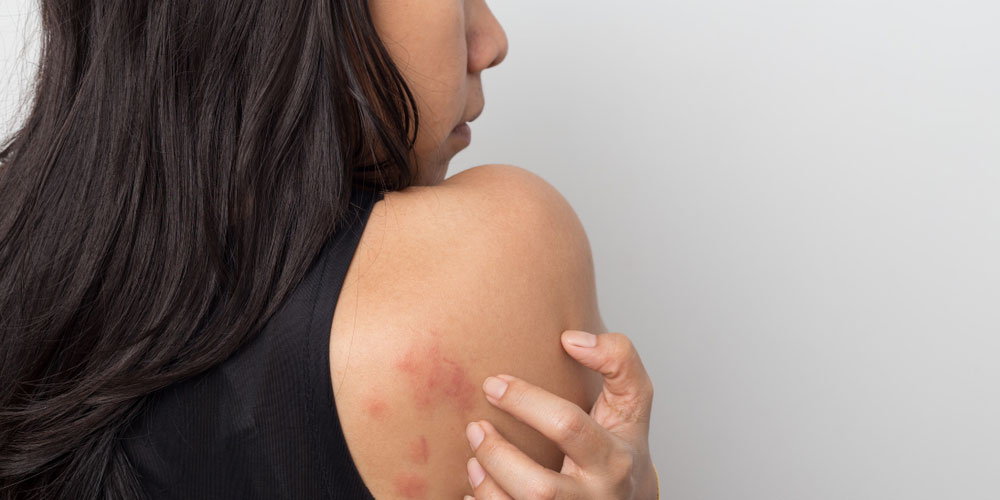
Why Choose Our Clinic for Urticaria Treatment?
- Safe, natural, and side-effect free remedies
- Personalized homeopathic care for each patient
- Long-term relief from itching and rashes
- Focus on immune and skin health
Urticaria
Urticaria is an itchy, raised area of the skin that occurs as a result of an allergic reaction. They may be rounded or flat-topped, but they are always elevated above the surrounding skin. Urticaria is also known as "Hives" or "Nettle rash". Twenty percent of people experience it at some point during their lives. There is a wide range of severity when it comes to the itching. There are many factors that can worsen itching, including scratching, drinking alcohol, exercising, and experiencing emotional stress.
Urticaria is caused by the following factors :
Allergies are the cause of urticaria. A number of things can cause this allergy. There are a variety of normal and commonly used products or even natural substances that could be allergens. When an otherwise harmless substance is present in the body of an affected person, the immune system may respond abnormally.
There are a variety of foods that can cause Urticaria, such as nuts, chocolates, fish, tomatoes, eggs, fresh berries and milk. Hives are more likely to occur when fresh foods are consumed than when cooked foods are consumed. Also, certain preservatives and additives in food may cause Urticaria.
There are several types of urticaria:
- Urticaria acute : Hives that last less than six weeks. Certain foods, medications, or infections are the most common causes. It may also be caused by insect bites and internal diseases.
- Chronic Urticaria : Hives lasting more than six weeks are considered chronic urticaria. Hives causing this type of urticaria are usually more difficult to diagnose than those causing acute urticaria. Urticaria is difficult to diagnose in most cases. It may also be caused by thyroid disease, hepatitis, infection, or cancer in some cases
- Drug-induced Urticaria : Urticaria caused by drugs has been linked to severe cardiorespiratory failure. Sulphonyl urea glimepiride, an anti-diabetic drug, has been documented to cause urticarial reactions in patients.
Symptoms
It is possible for symptoms to last for minutes, months, or even years depending on where they occur on the body.
- In short periods of time, hives can appear anywhere on the body; they may change shape, move around, disappear, and reappear.
- There are usually red or skin-colored "wheals" with clear edges that appear suddenly and disappear quickly.
- The center of a red hive turns white when pressed. This process is called "blanching."
Urticaria : How can it be diagnosed ?
An allergist should evaluate chronic hives with a family and medical history, exposure to substances at home and at work, exposure to pets and other animals, and recent medications taken. Skin tests, blood tests, and urine tests may be performed by an allergist to determine the cause of hives.
Allergists may perform skin-prick tests or blood tests to determine whether a specific food is the suspected trigger. They advise to avoid foods and products made from those triggers once they have been identified. Occasionally, the allergist may recommend an oral food challenge, where you eat a measured amount of the suspected trigger to see if hives develop. The allergist can perform similar tests, and a cautious drug challenge - similar to an oral food challenge, but with medications - may also be required to confirm the diagnosis.
What is the role of homeopathy in treating Urticaria ?
Over the centuries, homeopathy has consistently shown good results in treating Hives and Urticaria. Patients all over the world have experienced this and so have homeopathic doctors. The results have been very encouraging in even the most severe and chronic cases.
A person's whole health is treated by homeopathy. This means that homeopathic treatment emphasizes both the patient's pathological condition and his character as a person. Homeopathic remedies for Urticaria are selected after an individualizing examination and case analysis, including the patient's medical history, physical and mental constitution, etc. When treating chronic conditions, miasmatic tendencies are often considered.
If you are facing any skin problems, then visit Synopsis Clinic in Panvel for expert consultation by Dr. Tripti Ratnakar.
